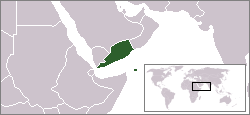Aden Emergency
| Aden Emergency | |||||||
|---|---|---|---|---|---|---|---|
| Part of the Cold War and the Arab Cold War | |||||||
 The location of the Aden Protectorate |
|||||||
|
|||||||
| Belligerents | |||||||
|
Supported by |
|||||||
| Commanders and leaders | |||||||
|
|
Abdullah Al Asnag |
||||||
| Strength | |||||||
| 30,000 British personnel at peak (3,500 in November 1967) 15,000 South Arabian Army troops |
|||||||
| Casualties and losses | |||||||
|
British: 90-98 killed 510 wounded South Arabian Army: 17 killed, 58 wounded |
382 killed 1,714 wounded |
||||||
| Total: 2,096 killed | |||||||
B Squadron, 5th Royal Tank Regiment also served in Aden in an Infantry role
The Aden Emergency was an insurgency against the British Crown forces in the British controlled territories of South Arabia which now form part of the Yemen. Partly inspired by Nasser's pan Arab nationalism, it began on 14 October 1963 with the throwing of a grenade at a gathering of British officials at Aden Airport. A state of emergency was then declared in the British Crown colony of Aden and its hinterland, the Aden Protectorate. The emergency escalated in 1967 and hastened the end of British rule in the territory which had begun in 1839. On 30 November 1967, British forces withdrew and the independent People's Republic of South Yemen was proclaimed.
...
Wikipedia
